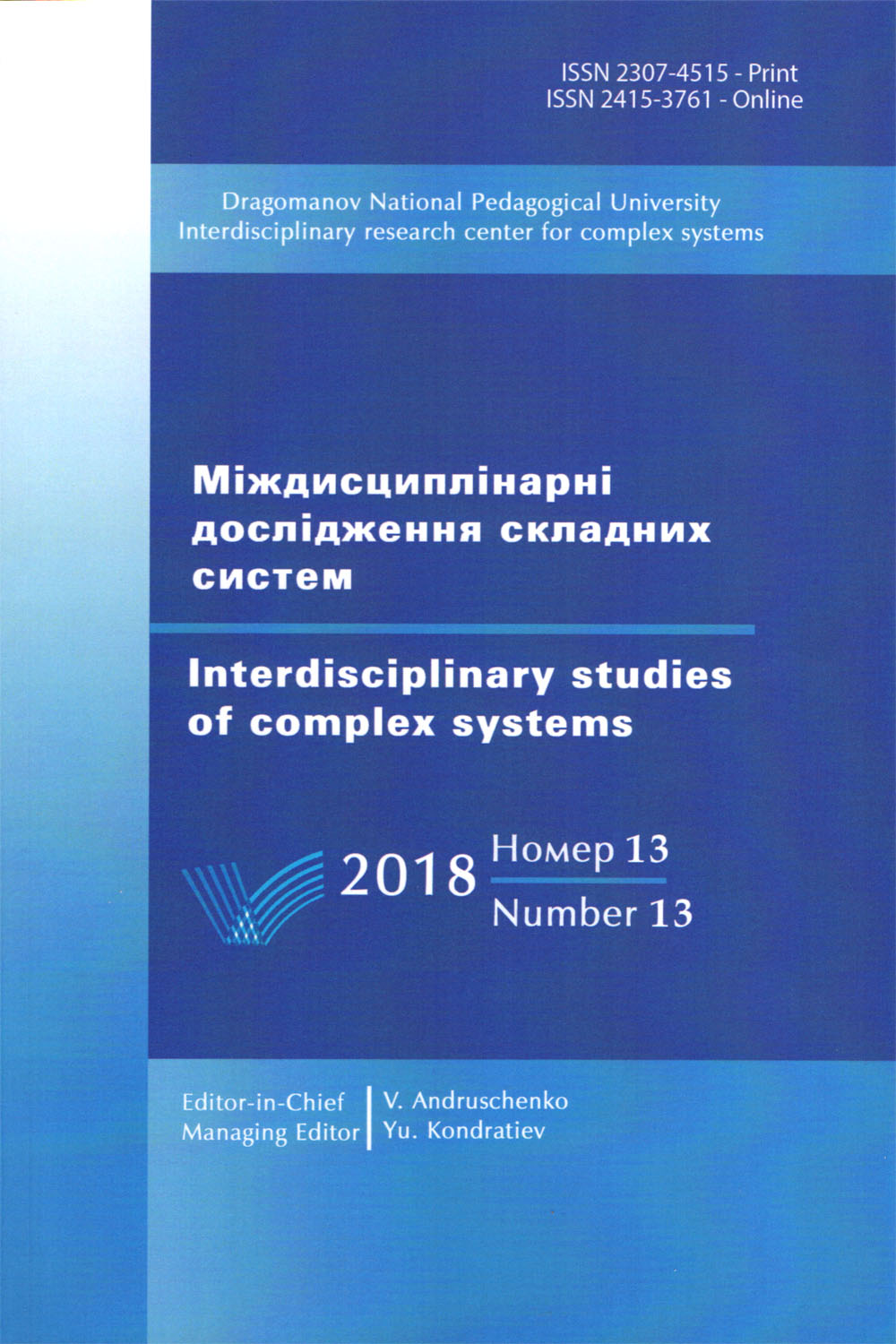Development of interview taking competence by beginner journalists with the help of a psychophysiological component
DOI:
https://doi.org/10.31392/iscs.2018.13.085Ключові слова:
interview taking competence, theoretical component, begin- ner journalists, psychological factors, psychophysiological componentАнотація
In this article, the authors have researched interview-taking confidence as a necessary component of journalistic work. They have provided analysis of difficulty of interviewing instrument developing. They identify professional and psychological factors that prevent students of departments of journalism and beginners in media sphere to get necessary skills of professional communication. On the basis of a sociological survey, they have proved that beginner journalists realize difficulty of skills that form mastery of an interviewer. They have suggested a solution to the researched problem by qualitative learning of a theoretical component in the process of professional development. The authors have also suggested the recommendations on the application of psychophysiological component, which is an effective tool for overcoming the psychological and physiological difficulties that arise during the development of the competence of the interview.
Посилання
Adams, S. and H. Wynford. 2011. Interviewing for Journalists. Second edition. New York: Routledge.
Beaman, J. 2011. Interviewing for Radio. Second edition. New York: Rou-tledge.
Biel, B., O. Burmahin, T. Patora, and O. Khomenok. 2013. Posibnyk z zhurnalistskykh rozsliduvan [Handbook on journalist investigation]. Kyiv: Biznespolihraf.
Clayman, S. and J. Heritage. 2004. The News Interview Journalists and Public Figures on the Air. Second edition. Cambridge: Cambridge University Press.
Ekstrom, M. and M. Patrona. 2011. Talking Politics in Broadcast Media. Cross-cultural perspectives on political interviewing, journalism and accountability. Amsterdam: John Benjamins Publishing Company.
Fedorova, A. 2014. Sotsiokomunikatsiini aspekty redahuvannia televizii-noho interviu: kryterii pidboru uchasnykiv i problemy komunikatsii mizh veduchym i hostem na prykladi prohramy «Chas interviu» na 5 kanali. [Socio-communicational aspects of editing of TV interview: the criteria of casting and problems of communication of achor and guest by example of «Interview time» show on 5th channel]. Obrii drukarstva. 1(3).
Frenkel, O. 2013. Zhanrova svoieridnist interviu yak typu komunikatsii: portretne interviu. [Genre originality of interview as a type of communication: a portrait interview]. Yednist navchannia i naukovykh doslidzhen — holovnyi pryntsyp universytetu. Zbirnyk naukovykh prats zvitno-naukovoi konferentsii vykladachiv universytetu za 2013 rik, 4-6 liutoho 2014 roku. Kyiv: National Pedagogical Dragomanov Univerity.
Grigoryan, M. 2007. Posobie po zhurnalistike [Handbook on journalism]. Moscow: Prava cheloveka.
Guerrero, M. and S. Griffen. 2013. Reporter’s Guide to the Millennium Development Goads. Covering Development Commitments for 2015 and Beyond. Vienna: International Press Institute.
Hall, C. 1999. Writing Features & Interviews. How to Build a Career As a Freelance Journalist. Plymouth: How to Books.
Haller, M. 2011. Interview. Kyiv: Akademiia ukrainskoi presy.
Ilchenko, S. 2016. Interviu v zhurnalistike: kak eto delaetsia. [Interview in journalism: how to do it]. St. Petersburg: High School of Journalism and Mass Communications.
Ivashchuk, A. 2013. Transformatsiia zhanriv i problema iikhnioi identy-fikatsii v teorii ta zhurnalistskii praktytsi. [Transformation of genres and problem of their identification in theory and practice]. Humatitarna osvita v tekhnichnykh vyshchykh navchalnykh zakladakh. 27.
Kodola, N. 2011. Interviu: Metodika obucheniia. Prakticheskie sovety. [Interview: methodology of learning. Practical tips]. Moscow: Aspekt Press.
Kolesnichenko, A. 2013. Nastolnaia kniga zhurnalista. [Journalist handbook]. Moscow: Aspekt Press.
Krinitsyn, Ye. 2016. Akuly interviu: 11 master-klassov. [Sharks of interview: 11 workshops]. Moscow: Alpina Publishers.
Kuzmenko, O. 2016. Osoblyvosti interviu yak movlennievoho zhanru. [Peculiarities of interview as a speech genre]. Visnyk Zhytomyrskoho derzha-vnoho universytetu imeni Ivana Franka: Filolohichni nauky. 2(84).
Lukina, M. 2012. Tehnologiya interviu. [Interview technique]. Moscow: Aspekt Press.
Mykhailyn, I. 2011. Osnovy zhurnalistyky. [Journalism basics]. Kyiv: Tsentr uchbovoi literatury.
Sedorkin, G. and J. McGregor. 2002. Interviewing. A guide for journalists and writers. Crows Nest: Allen & Unwin.
Symonina, N. 2012. Klasyfikatsiia suchasnoho televiziinoho interviu. [Classification of modern television interview]. Naukovyi visnyk Uzhhorodskoho universytetu. Seriia: Filolohiia. Sotsialni Komunikatsii. 27.
Zdoroveha, V. 2004. Teoriia i metodyka zhurnalistskoi tvorchosti. [Theory and methodology of journalist creativity]. Lviv: PAIS.
Nedopitanskiy, M. 2009. Uroki z zhurnaliskoyi praktiki. [Theory and methodology of journalist]. Kyiv: Ukrayina moloda.
Sakazli, F. 2012. Dihalna gimnastika v sistemi fizichnogo vihovannya [Fi-zioterapiya]. Kyiv: Mikolayivskiy natsionalniy agrarniy universitet.
Golub, O. 2016. Medlakompas: putlvnik profeslynogo zhurnallsta. Kyiv: Institut masovoyi informatsiyi.
##submission.downloads##
Опубліковано
Номер
Розділ
Ліцензія
Автори, які публікуються у цьому журналі, погоджуються з наступними умовами:- Автори залишають за собою право на авторство своєї роботи та передають журналу право першої публікації цієї роботи на умовах ліцензії Creative Commons Attribution License, котра дозволяє іншим особам вільно розповсюджувати опубліковану роботу з обов'язковим посиланням на авторів оригінальної роботи та першу публікацію роботи у цьому журналі.
- Автори мають право укладати самостійні додаткові угоди щодо неексклюзивного розповсюдження роботи у тому вигляді, в якому вона була опублікована цим журналом (наприклад, розміщувати роботу в електронному сховищі установи або публікувати у складі монографії), за умови збереження посилання на першу публікацію роботи у цьому журналі.
- Політика журналу дозволяє і заохочує розміщення авторами в мережі Інтернет (наприклад, у сховищах установ або на особистих веб-сайтах) рукопису роботи, як до подання цього рукопису до редакції, так і під час його редакційного опрацювання, оскільки це сприяє виникненню продуктивної наукової дискусії та позитивно позначається на оперативності та динаміці цитування опублікованої роботи (див. The Effect of Open Access).











